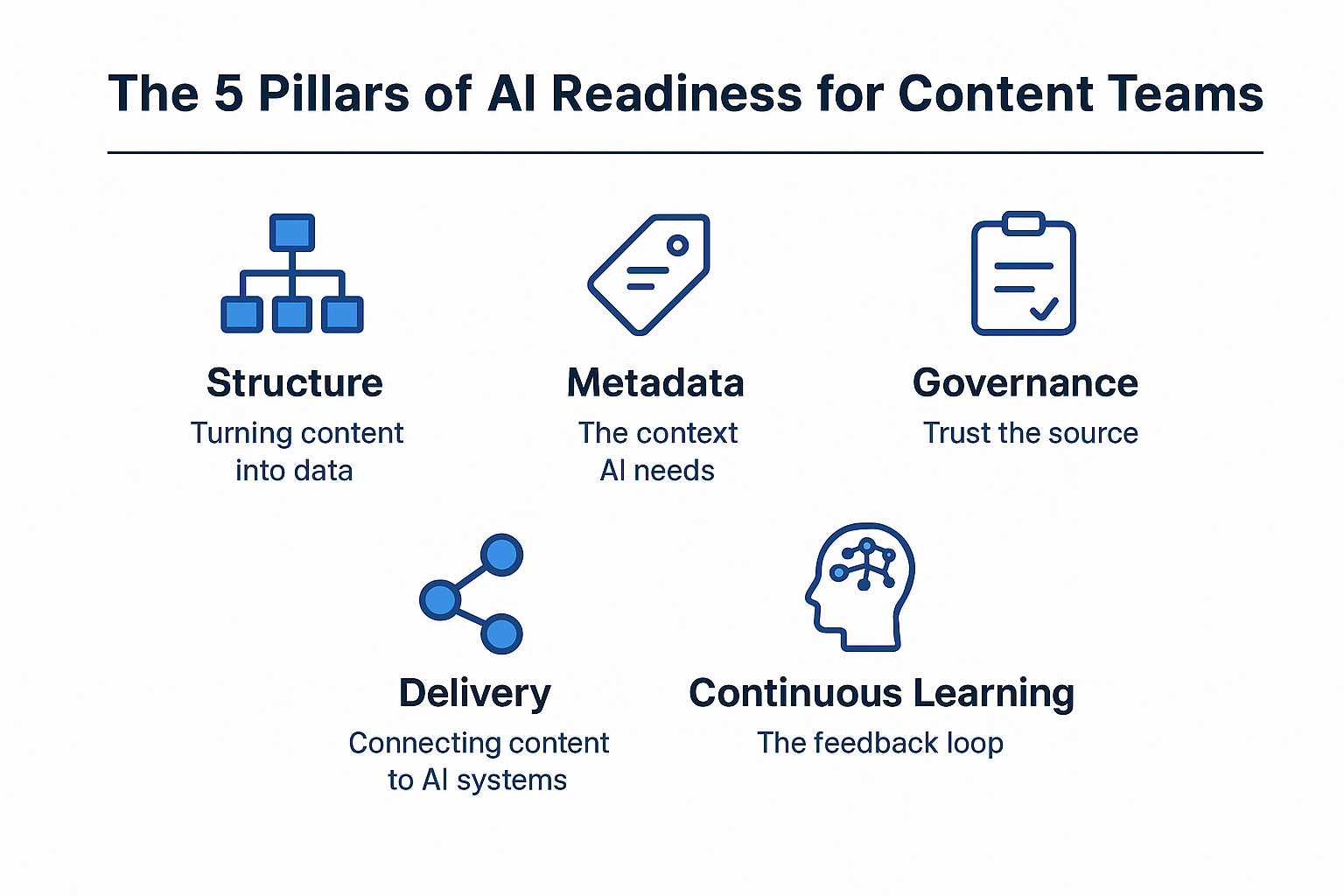AI Readiness Begins with Data
| About this Article | Published November 1 2025 By Malcolm Teasdale Tags: ai readiness, content strategy, cms, data governance |
Intro: Why Everyone’s Talking About AI (and Why Data Still Matters Most)
Artificial Intelligence is reshaping how we create, manage, and deliver content. From automated writing to personalization and predictive analytics, it is transforming digital experiences at every level.
But here’s the thing no one likes to admit: most organizations aren’t actually ready for AI. They might have big ambitions, shiny tools, and a few proof-of-concepts underway, but when you dig beneath the surface, there is a missing piece. That piece is data and more specifically, content data.
The truth is: AI is only as good as the data it learns from.
Before you can automate insights or build smarter workflows, your organization needs a solid foundation: structured, consistent, and well-governed data. For most teams, that foundation lives right inside their Content Management System (CMS).
Your CMS is not just a publishing tool anymore. It is where content becomes data — and data becomes the backbone of AI readiness.

1. Structure: Turning Content Into Data
AI thrives on structure. When your content is neatly organized into types (like articles, authors, products, and topics) and connected through relationships, your CMS turns text into usable, queryable data.
This structure allows AI systems to:
- Recognize patterns between related pieces of content
- Retrieve specific information faster
- Make sense of your organization’s knowledge base
A well-modeled CMS makes your content machine-readable giving AI something meaningful to work with.
2. Metadata: The Context AI Needs
AI doesn’t just need content — it needs context. That’s what metadata provides.
By tagging content with attributes like topic, audience, tone, or region, your CMS makes it easier for AI to interpret, classify, and personalize content automatically.
Modern CMS platforms go a step further:
- Suggest metadata through AI-driven tagging
- Enforce taxonomy standards
- Keep relationships consistent across your content ecosystem
“Metadata isn’t just an SEO trick anymore. It is the language your AI uses to understand your world.”
3. Governance: Trust the Source
Even the smartest AI models are only as reliable as their sources. That’s why content governance is key to AI readiness.
A CMS ensures that every piece of content follows the right workflow, passes through review and approval, and stays compliant with policies. It provides:
- Role-based permissions
- Version control and audit trails
- Workflow routing for review and sign-off
This structure creates a single source of truth that your AI can safely learn from without risk of outdated, inaccurate, or non-compliant content creeping in.
4. Delivery: Connecting Content to AI Systems
AI-readiness doesn’t stop once your content is organized. The next step is connecting that data to AI applications.
With APIs, your CMS can feed verified content directly into Retrieval-Augmented Generation (RAG) systems or AI assistants. Instead of pulling from the open web, your AI draws from your approved content repository ensuring every output is accurate, compliant, and brand-aligned.
That is how your CMS evolves from a publishing platform into a content intelligence platform.
5. Continuous Learning: The Feedback Loop
Once AI systems start consuming and analyzing your CMS data, the loop begins:
- AI surfaces insights about content performance and gaps
- Those insights feed back into your CMS and content strategy
- Your content structure improves over time
It is a self-reinforcing cycle of better data, smarter AI, and more effective content.
Summary: AI Readiness Starts with Content Discipline
Being “AI-ready” is not about having the latest model. It’s about ensuring your content is clean, structured, and trusted. A well-implemented CMS does more than publish pages. It shapes your content into a data-driven foundation that AI can rely on.
Build Your Foundation for AI with Gitana
At Gitana, we help teams model, manage, and govern their content so it is structured, consistent, and ready for AI. Whether you’re enriching metadata, automating workflows, or integrating with RAG systems, Gitana gives you the framework to make it happen.
